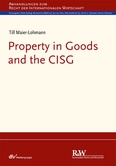35 § 3: Obligation to transfer the property and third party rights or claims
74
Under the CISG, Article 30 obliges the seller to transfer the property in the goods, and Article 41, sentence 1, stipulates that the goods delivered must be “free from any right or claim of a third party, unless the buyer agreed to take the goods subject to that right or claim.” The obligation to transfer the property is oftentimes considered a central pillar of sales law.186 While the sixth chapter below will outline the difficulties of unification with regard to the transfer of property, a question to be distinguished therefrom concerns the seller’s obligation to transfer the property and the liability for third-party rights.
75
It is only partially true that the drafters of uniform law simply intended to exclude the effect the contract has on the property in the goods, and not the obligation to transfer property. Rather, the drafters intended to avoid national traditional concepts and terms, such as “property”, in order to increase the odds that the resulting uniform sales law would be applied in a truly uniform manner. Consequently, Rabel and the committee members at Unidroit in the 1930s drafted the entire sales law without ever touching on matters that could be connected to national (property) law:
“Die Verpflichtungen des Verkäufers, das Eigentum und den Besitz zu übertragen, sowie die Gewährleistung wegen Rechtsmangels bleiben außerhalb der Vereinheitlichung. Der Entwurf kennt daher nur eine einzige Hauptverpflichtung des Verkäufers, die zur ‘Lieferung’. Dieser Begriff aber bildet die Grundlage der ganzen Ordnung. [...] Wir brauchten jedenfalls einen Begriff, der vollkommen unabhängig von dem ganzen juristischen System der Mobiliarübertragung bleibt; dank ihm kann der Entwurf die Hauptverpflichtung des Verkäufers näher regeln, ohne alle die Fragen irgend zu berühren, die sich um Wesen und Terminologie des Eigentumsübertrags und der Besitzübertragung drehen.” 187
76
Consequently, the first draft of a uniform sales law of 1935 contained neither an expression obliging the seller to transfer the property nor one providing for the seller’s liability when the buyer faces third-party rights or claims.188 The exclusion of questions related to property was, thus, originally more far-reaching than merely the effect the contract has on the property in the goods. Given today’s Articles 30 and 41 of the CISG, it is obvious that the process of drafting uniform rules has continued to evolve. This chapter analyzes the scope of the obligation to transfer the property under Article 30 and the liability for third party rights and claims under Article 41. To this end, an understanding of “property” under the CISG is necessary.
77
This chapter will first explain Rabel’s distinction between different kinds of obligations to transfer the property. This differentiation was and remains necessary because jurists from different countries refer to different kinds of obligations when they refer to “the” obligation to transfer the property. Thereafter, a brief overview of the position under Roman law and the obligation’s development tracing it to current national laws is necessary to understand certain arguments on the interpretation and the development of the CISG rooted in these national laws. Against this backdrop, the current interpretations of Articles 30 and 41 of the CISG will be explored, and a novel approach offered. The chapter concludes with a short outlook on the future of unification of these obligations, specifically under European law.
| 186 | For example, the statement by Great Britain in 1962, “le trait essentiel [du contrat de vente] est le transfert de propriété”, U. D.P. – Etudes: IV Vente – Doc. 102, p. 23. |
| 187 | Rabel, 9 RabelsZ (1935), 1, 56. My translation: The seller’s obligation to transfer the property and possession as well as the liability for legal defects remain beyond the scope of unification. Therefore, the draft only stipulates one main obligation of the seller: the obligation to deliver. The notion of ‘delivery’ serves as the basis for the entire regulation. [...] We needed a concept that would remain completely independent of the entire legal system of the transfer of [property in] movables. With this concept [delivery], the draft can regulate the main obligation of the seller in more detail without touching on all the questions that revolve around the nature and terminology of the transfer of property and possession. |
| 188 | The first draft can be found in Rabel, Recht des Warenkaufs II, pp. 374 et seq. Norway supported the laguna with regard to the obligation to transfer the property and the seller’s liability for third party rights, and even proposed to go further and change Art. 5 of the draft to explicitly state that the liability for eviction was not governed by the uniform sales law, S. D.N.-U. D.P. 1936 – Etude IV – Vente – Doc. 82, p. 53. Skeptical by contrast, Poland, S. D.N.-U. D.P. 1936 – Etude IV – Vente – Doc. 82, p. 87. |


